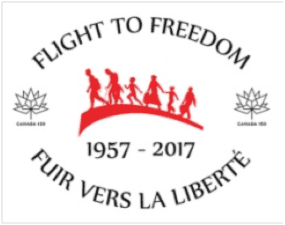Location: St. Paul University and Canadian Museum of History /
Université Saint-Paul et Musée canadien de l’histoire, October 21-23, 2017
October 6th, 2017
 It is hard to believe that ten years have passed since the creation of this website by the then newly established Canada-Hungary Educational Foundation to mark the 50th anniversary of the arrival of 38,000 Hungarian refugees to Canada after the failed uprising of 1956. Since that time the Canadian government has declared the arrival of those refugees an event of national historic significance and indeed most Canadians consider it a given that refugees and immigrants are as much an integral part of Canada’s evolving national identity as are the indigenous “first nations” and the founding Anglophone and Francophone settlers. So it seemed quite natural and appropriate for us to look for partners and develop a project to celebrate the 60th anniversary. The result is the conference “Flight to Freedom: The Canadian Refugee Experience Since 1957/ Fuir vers la liberté: l’expérience des réfugiés au Canada depuis 1957” to reflect on how this historic refugee movement has continued to influence and shape Canadian refugee policy and the country itself. Who knows, we may even start a new and technically more updated website to keep up with the times.
It is hard to believe that ten years have passed since the creation of this website by the then newly established Canada-Hungary Educational Foundation to mark the 50th anniversary of the arrival of 38,000 Hungarian refugees to Canada after the failed uprising of 1956. Since that time the Canadian government has declared the arrival of those refugees an event of national historic significance and indeed most Canadians consider it a given that refugees and immigrants are as much an integral part of Canada’s evolving national identity as are the indigenous “first nations” and the founding Anglophone and Francophone settlers. So it seemed quite natural and appropriate for us to look for partners and develop a project to celebrate the 60th anniversary. The result is the conference “Flight to Freedom: The Canadian Refugee Experience Since 1957/ Fuir vers la liberté: l’expérience des réfugiés au Canada depuis 1957” to reflect on how this historic refugee movement has continued to influence and shape Canadian refugee policy and the country itself. Who knows, we may even start a new and technically more updated website to keep up with the times.
This three-day conference (October 21-23, 2017) explores Canada’s involvement in the central issue of our time: the global search by refugees for a safe home in light of this country’s history of immigration and nation-building. Recognizing Canada’s 150th celebrations and also the 60th anniversary of the arrival and settlement of 38,000 Hungarian refugees during 1957, this conference uses their example to investigate how government and civil society can work together. We begin with the example of Hungarian refugees because this was the first time that such a large group of refugees arrived here from one county. That experience, identified by the Canadian government in 2010 as an event of national historic significance, helped shape the development of subsequent refugee policies and programs. When large numbers of Ugandan Asians and Vietnamese refugees arrived in the 1970s, and more recently the refugees escaping Syria, Canada had the example of 1957 as a benchmark. The conference will look at the impact of the arrival of refugees from these and other groups on Canadian society and culture. What, then, is Canada’s role today, given the global rise of anti-immigrant and anti-refugee movements? This conference and its diverse cultural components address this important question. The program includes a reading by award winning writer M.G. Vassanji and the screening of a 2016 documentary about the Vietnamese “Boat People” and their journey to Canada (Une nuit sans lune/ a Moonless Night). The keynote address will be given by The Hon Bob Rae in the morning of October 23rd.
The closing roundtable discussion of the conference, “Protecting Refugees in Challenging Times: Canada’s Role at Home and Abroad” is taking place at the Canadian Museum of History and will examine Canada’s responses to the current global refugee situation. Exploring the crisis against a backdrop of rising anti-immigrant political and populist movements around the world, a group of policy makers, academics, and refugee advocates discuss Canada’s potential role, both at home and abroad. Panellists include Peter Showler, former chairperson of the Immigration and Refugee Board of Canada; Naomi Alboim, Distinguished Fellow at Queen University’s School of Policy Studies; Emilie Coyle, Director, Refugee Sponsorship Support Program, Refugee Hub, University of Ottawa; Janet Dench, Executive Director of the Canadian Council for Refugees; Mitchell Goldberg, President of the Canadian Association Refugee Lawyers; and James Trepanier, Curator of Post-Confederation Canada at the Canadian Museum of History. The roundtable is to be moderated by Andrew Burtch, Post 1945 Historian at the Canadian War Museum and Adjunct Research Professor at Carleton University.
The conference is open to the general public (with a modest daily registration fee to cover refreshment costs) and is organized by a partnership committee of the Canada-Hungary Educational Foundation, the Canadian Immigration Historical Society, the University of Ottawa, University Saint Paul, The Canadian Museum of History, St Joseph’s Parish Ottawa, The Canadian Museum of Immigration at Pier 21, and other interested partner institutions and individuals.
Flight-to-Freedom-Conference Programme
Media Advisory – Does Canada still see itself as a protector of refugees?
